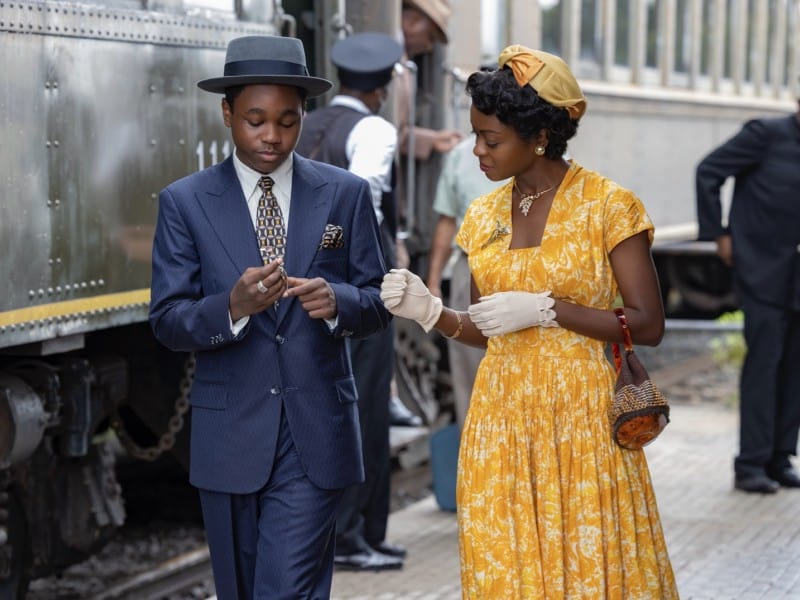As part of our coverage of the 60th annual New York Film Festival, Will DiGravio reviews Chinonye Chukwu’s latest film, Till. Follow along with more coverage in our New York Film Festival archives.
Near the end of Till, the remarkable, superbly crafted new film from director Chinonye Chukwu, the camera remains on the face of Mamie Till-Mobley, played by Danielle Deadwyler, in what may be the greatest movie performance of the year. She is on the stand testifying about the 1955 murder of her son Emmett, who had been lynched while visiting cousins in Money, Mississippi. The white male defense attorney begins questioning Mamie. But rather than cut to him, the camera stays on her. As he speaks, we watch her listen and respond. This ingenious cinematic moment becomes emblematic of the film itself. Till centers Mamie Till-Mobley in this story, one of the love between mother and son and a life of activism in the decades that followed.
Till begins in Chicago. Fourteen-year-old Emmett, affectionately referred to as Bo, prepares to visit his cousins. His grandmother Alma (Whoopi Goldberg), supports the trip, but Mamie has reservations. Bo convinces his mom to buy him a new wallet and asks him to wear the ring of his father, who died while serving in the Second World War. Jalyn Hall gives a fantastically rich performance as Bo, who is at the age where one slowly begins to find oneself but is still so young in every way. The camera circles the room as Bo and his mother dance before he sets off, capturing the tender relationship between the two. The circling camera is a gesture Chukwu, and cinematographer Bobby Bukowski return to again and again, recalling this early moment of familial bonds.
The film is decades in the making, going back to Mamie’s own efforts to get a film off the ground in the wake of her son’s murder. The work also takes part of its inspiration from the decades-long work of Keith Beauchamp, one of the film’s producers who co-wrote the script with Chukwu and co-producer Michael Reilly. Beauchamp, who befriended Mamie and counted her as a mentor, released the documentary The Untold Story of Emmett Louis Till in 2005. In watching Till, one gets a sense of this deep history. The film carries with it a kind of temporal simultaneity. It is at once a depiction of a certain time and event in history and also a portrait of the world now and in the years that followed.
Chukwu’s work presents a tremendous vision. The textured images feel deliberately crafted. Characters walk in and out of frames. Doorways, railings, and other containers frame the characters and convey a heightened subjectivity. Many of the film’s visual choices are centered around what we do and do not see. We catch only a glimpse of the white killers. The camera lingers on the face of Mamie. We do not see the brutal killing of Emmett Till. The camera waits at the morgue as Mamie sees the body of her son for the first time. The camera then moves towards Mamie, following her eyes as she looks down at the mutilated body of her son. It is a devastating moment. It is also a turning point. Mamie, understanding the power of sight, decides in that moment to give Emmett an open-casket funeral. In that moment, she becomes a national leader.
Deadwyler’s performance is as layered as the filmmaking. Mamie experiences intense grief at the same time she must inspire others. She must put herself in harm’s way by fighting for justice that will never come. As she grapples with the injustice of it all, she finds a way to forgive the family members responsible for Emmett the night of his death. Her resolve and strength pour out of the screen. Awards speculation is almost always tiresome. But as long as they are giving them out, Deadwyler’s performance should win them all.
While Deadwyler as Mamie takes center stage in the film, the supporting cast is incredibly strong too. Goldberg, in particular, gives a memorable performance with her limited screen time. One feels the intergenerational grief, anxiety, and guilt. Another great performance comes from John Douglas Thompson, who plays Moses Wright, Emmett’s great-uncle. Moses was responsible for Emmett on the night he was abducted and killed for whistling at a white woman, Carolyn Bryant (Haley Bennett). Mamie sees a gun hanging on Moses’ wall and asks him why he did not use it that night. Because he says he had to make a choice. If he had, his children would have been killed too. It is a devastating moment. And made even more so by the performers and their characters’ understanding that what he says is painfully true.
Till falls into the biopic genre. But the film, in centering Mamie, really is only a partial biopic. It deals with just one part of a remarkable life. This is a story that should be told over and over again. For now, though, Till is a monumental achievement and one of the best films of the year.

